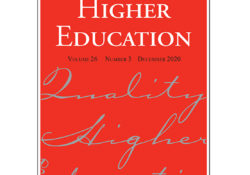eric.ed.gov har udgivet: The Study of School Turnaround (SST) examines the change process in a diverse, purposive sample of schools receiving federal School Improvement Grants (SIG) from 2010-11 to 2012-13. With the passage of the American Recovery and Reinvestment Act of 2009 (ARRA), the SIG program underwent three major shifts. First, ARRA boosted total SIG funding in fiscal year 2009 to approximately 6.5 times the original 2009 appropriation through Title I, section 1003(g) of the Elementary and Secondary Education Act (ESEA). SIG funds were distributed to states by formula based on each state’s Title I share. States then had to competitively make SIG awards to districts with eligible schools. Second, ARRA targeted funds at only the very worst schools–those that were in the bottom 5 percent of performance and had… Continue Reading →
Like this:
Like Loading...
eric.ed.gov har udgivet: In response to the recession that began in 2007, the U.S. Congress passed, and President Barack Obama signed into law, the American Recovery and Reinvestment Act of 2009 (Pub. Law 111-5). At an estimated cost of $831 billion, this economic stimulus package sought to save and create jobs, provide temporary relief to those adversely affected by the recession, and invest in education, health, infrastructure, and renewable energy. States and school districts received $100 billion to secure teachers‛ jobs and promote innovation in schools. This funding included $3 billion for School Improvement Grants (SIG), one of the Obama administration’s signature programs and one of the largest federal government investments in an education grant program. The SIG program awarded grants to states that agreed to implement one of four… Continue Reading →
Like this:
Like Loading...
eric.ed.gov har udgivet: This report measures trends in performance among urban schools receiving federal School Improvement Grant (SIG) awards as part of the American Recovery and Reinvestment Act of 2009 (ARRA). The Council of the Great City Schools aims to document how member districts of the Council of the Great City Schools implemented SIG and specifically what effects the program had on student test scores and school „holding power‟–the ability of high schools to move students through the system on a timely basis. Finally, based on interviews with district and school-based staff in several case study districts, common characteristics of successful and unsuccessful implementation of the SIG program in Council schools and districts are identified and described. Results of the analysis across states for grades three through eight in both… Continue Reading →
Like this:
Like Loading...
tandfonline.com har udgivet en rapport under søgningen „Teacher Education Mathematics‟: ABSTRACT ABSTRACT This account explores the form and extent of research fraud, the time it takes to investigate these frauds and the inadequacy of university investigations. There also appears to be reluctance to communicate details about fraudulent papers to the scientific community. The sensationalist reporting of fraud is explored. Underlying the analysis is the question as to whether the structure of rewards in higher education encourages research fraud. The analysis addresses the structure of rewards in higher education and the impact that has on researchers, creating the potential for the normalisation of research fraud. Link til kilde
Like this:
Like Loading...
eric.ed.gov har udgivet: In response to the recession that began in 2007, the U.S. Congress passed, and President Barack Obama signed into law, the American Recovery and Reinvestment Act of 2009 (Pub. Law 111-5). At an estimated cost of $831 billion, this economic stimulus package sought to save and create jobs, provide temporary relief to those adversely affected by the recession, and invest in education, health, infrastructure, and renewable energy. States and school districts received $100 billion to secure teachers‛ jobs and promote innovation in schools. This funding included $3 billion for School Improvement Grants (SIG), one of the Obama administration’s signature programs and one of the largest federal government investments in an education grant program. The SIG program awarded grants to states that agreed to implement one of four… Continue Reading →
Like this:
Like Loading...
eric.ed.gov har udgivet: Every year, the Improving Teacher Quality State Grants Program issues a Request for Proposals (RFP) to award funds provided annually from the federal No Child Left Behind Act of 2001. In recent years, each RFP has focused on a specific objective tied to state priorities in teacher quality. Six grants were awarded in 2008: (1) Bell Gardens Science Project; (2) Science and Academic Library; (3) Algebraic Learning in Elementary Grades: Results, Independence, Achievement (ALEGRIA!); (4) Teacher Efficacy Affects Math and Science Success (TEAMS!); (5) Advancing Collaboration For Equity In Science (ACES); and (6) Making Algebra Accessible Project (MAAP). Since 2005, the grants have required scientifically based evaluation research in each project. The intent is to extend project evaluation beyond evaluating whether grants effectively carried out the promised… Continue Reading →
Like this:
Like Loading...
eric.ed.gov har udgivet: Since its inception in 2002, the National Center for Education Research (NCER) in the Institute of Education Sciences (IES) has funded over 700 education research grants and over 60 education training grants. The research grants have supported exploratory research to build theory or generate hypotheses on factors that may affect educational outcomes, development and innovation research to create or refine academic interventions, evaluation studies to test the efficacy and effectiveness of interventions, and measurement work to help develop more accurate and valid assessments, and the training grants have helped prepare the next generation of education researchers. NCER’s education research grantees have focused on the needs of a wide range of students, from pre-kindergarten through postsecondary and adult education, and have tackled a variety of topic areas. The… Continue Reading →
Like this:
Like Loading...
